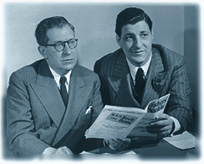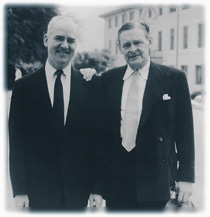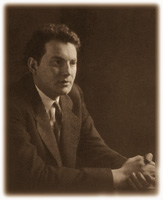Main Menu · Search · Current Issue · Contact · Archives · Centennial · Letters to the Editor · FAQs
| Jonathan Galassi in his office at Farrar, Straus & Giroux Photographs by Frank Veronsky |
 |
 |
 |
 |

In 1986, Random House fired senior editor Jonathan Galassi '71 after five years with the firm. Galassi had been a wunderkind at his previous employer, Houghton Mifflin Company, rising to head its New York editorial office by age 30. But at Random House things had begun badly: best-selling novelist Pat Conroy, author of The Prince of Tides and The Lords of Discipline, wanted to stay with Galassi, but Random House did not back the editor in signing him. Then, a couple of years later, owner S.I. Newhouse decided to rev up the Random House list, making it "livelier" and more commercial, and brought in Howard Kaminsky from Warner Books as publisher. Kaminsky eventually determined that Galassi "didn't have any books with commercial potential," as Galassi recalls--and fired him.
However, fate sometimes plays clever pranks. That fall, the distinguished New York publishing firm of Farrar, Straus, & Giroux (FSG) hired Galassi as executive editor. Shortly after starting, he had jury duty, which turned out to be excellent preparation for a manuscript he soon received. "I sat at my desk for days and couldn't stop reading it," Galassi remembers. "It was gripping, a terrifically compelling book."
The novel, a highly literate legal thriller, was Presumed Innocent, by Scott Turow, J.D. '78. Galassi acquired the book for Farrar, Straus, which paid a substantial advance, although another publisher actually outbid them by 50 percent. Money was not the decisive factor. "Being published by Farrar, Straus, & Giroux was part of my dream," says Turow. "Every publisher produces books of substance and value, but nobody's list has been as deep and consistent as FSG's. That's been true throughout my life as a reader. They're simply better than everybody else."
 John Farrar (left) and Roger Straus in 1946, at the founding of their publishing house, Farrar and Straus. John Farrar (left) and Roger Straus in 1946, at the founding of their publishing house, Farrar and Straus. |
When it appeared in 1987, Presumed Innocent sold more than 600,000 copies in hardcover, occupying the top spot on the New York Times bestseller list for several weeks; it was the sensation of the year. "It was the type of book you would expect Random House to do," says Galassi. "But the fact that we published it gave it a certain extra something." Ironically, after being fired for not acquiring commercial books--and moving to a more "literary" house--Galassi had, within his first month at FSG, landed one of the great commercial successes in modern publishing history.
Farrar, Straus is the smallest of New York's eight "major" book publishers in annual sales, but in literary cachet its only rival is the venerable Alfred A. Knopf, now part of Random House. FSG--which celebrated its fiftieth birthday last year--publishes seven Pulitzer Prize-winning authors and 20 Nobel laureates, including poets T.S. Eliot '10, Pablo Neruda, Joseph Brodsky, Derek Walcott, and Seamus Heaney, Harvard's Ralph Waldo Emerson lecturer. "For poetry it has the best list of any company, and I think most poets would like to be published by them," says John Ashbery '49, himself an FSG poet. The house's novelists include Nobel laureates Nadine Gordimer and Isaac Bashevis Singer. In nonfiction, it has brought out all 24 books by the indefatigable John McPhee. Another Farrar, Straus "lifer" is Tom Wolfe, whose bestseller The Bonfire of the Vanities was the only other novel of 1987 to make a splash comparable to Presumed Innocent.
 Editor Robert Giroux with T.S. Eliot '10 at the University of Texas in 1955. That year, 17 authors--perhaps the greatest exodus in publishing history--followed Giroux from Harcourt Brace to what became FSG in 1964. COURTESY OF ROBERT GIROUX Editor Robert Giroux with T.S. Eliot '10 at the University of Texas in 1955. That year, 17 authors--perhaps the greatest exodus in publishing history--followed Giroux from Harcourt Brace to what became FSG in 1964. COURTESY OF ROBERT GIROUX |
Two years after his arrival at FSG, Galassi became editor-in-chief, and has since emerged as one of publishing's "shining stars--his track record in acquiring and editing top people speaks for itself," says Rick Wolff '73, senior editor at Warner Books. Allen Peacock '76, a senior editor at Henry Holt, FSG's sister company (the German publisher Verlagsgruppe Georg von Holtzbrinck owns Farrar, Straus, & Giroux, Henry Holt, and St. Martin's Press), identifies Galassi as "the preeminent literary editor in this country. He's been doing it better and longer than anyone." In the admittedly biased opinion of FSG cofounder Roger Straus, Galassi is "the best editor in America; he's got great taste, a wide canvas of interests, and a concentration level which is utterly amazing to me."
Galassi has achieved such recognition by adhering to time-honored standards in a publishing industry that, as he says, "has changed more in the last two decades than in the previous 200 years." In an era of book superstores and celebrity biographies, FSG still exalts editorial priorities, rather than marketing plans. "That's what Farrar, Straus has to offer: we're still doing it the old way. We want to publish books that make a difference. We don't expect them all to sell 100,000 copies," says Galassi. "So much of what is new and good starts out modest. You can't be driven by sales figures, or you'll miss the real action."
  |
| Legendary Scribner's editor Maxwell Perkins '07 (left) and one of his celebrated authors, Thomas Wolfe, A.M. '22. PHOTOGRAPH BY DORIS ULMANN. COURTESY OF MRS. PAMELA RANKIN-SMITH |
Galassi was born in Seattle--his father worked as an attorney for the Justice Department--but grew up in southeastern Massachusetts, in the town of Plympton. At Phillips Exeter Academy, he "got interested in poetry, writing, literature--most of the things I'm interested in today." At Harvard he lived in Winthrop and Dunster Houses, was elected a Lampoon editor, and became president of the Advocate; he concentrated in English and studied poetry with such luminaries as Robert Lowell '39, Elizabeth Bishop, and Theodore Morrison '23.
His senior year, he won a Marshall Scholarship to Christ's College, Cambridge, where he spent two years earning a B.A. in English literature and discovering that an academic career was not for him. "I didn't feel comfortable with the Yale approach that was in vogue--semiotics, deconstruction. It just didn't feel congenial to me," he says. "I wanted to be more involved with the making of contemporary literature than with analyzing the literature of the past." He returned to the States in 1973, taught expository writing at Harvard, and joined the editorial department of Houghton Mifflin in Boston. "I thought I'd try publishing," Galassi says, then adds, grinning, "I'm still trying it."
In those days publishing houses fronted all sides of the Boston Common: Beacon Press; Little, Brown; Houghton Mifflin; Atlantic Monthly Press; David Godine. A framed copy of Thoreau's contract for Walden hung on the wall of the president's office at Houghton Mifflin. "Everything was slower and the money wasn't as crazy; you still sent people carbon copies of letters," Galassi recalls. "There were no faxes--years later, when fax machines arrived, I remember my boss saying, 'I don't want to answer this letter so fast.' That time was sleepier, quieter, but more attention was paid. A lot gets lost in this fast shuffle. Houghton Mifflin in 1973 was sort of modeled on an old English publishing house--there were these Boston Brahmin editors who were very gentlemanly, very Old World, and who had very high standards. Publishing was a profession. Today that seems less the case."
In 1975 Galassi married Susan Grace--they have since had two daughters--and moved to Houghton Mifflin's New York office. "I was thrilled to get to New York City; I had always loved the metropolis," he says. At Houghton Mifflin, Galassi edited many first novelists, along with Pat Conroy, Louis Auchincloss, and poets Anne Sexton and Galway Kinnell. In 1981, he moved to Random House. "What I was most interested in, and probably best at, was working with new writers," he explains. "I thought Houghton Mifflin was too dowdy and not willing to take enough risks, and that this brash, highly successful company would do that. It turned out that Houghton Mifflin was actually more willing to take chances on the kinds of authors I liked than Random House was. It was never the right fit," though he did edit Janet Flanner, Vasily Aksyonov's The Burn, a Rilke translation by Stephen Mitchell, and many literary books and first novels.
"The excitement of seeing a book come into being is what's really fun in publishing--seeing the manuscript come in, take shape, coalesce. It's pretty thrilling, like a baby being born," Galassi says. "In this job, being a dilettante is very useful; having deep interests is also good. It's not a glamour game, though some authors are glamorous. Most words put down on paper are not interesting, or don't make sense, or are stilted. You can tell within two pages that something is not going to work; 80 percent you can eliminate immediately. You are always looking for a book that can cross genres, like Smilla's Sense of Snow--both a thriller and a literary novel. The Maxwell Perkins myth--how as an editor, he rescued Thomas Wolfe from himself--has hung like a cloud over publishing. It glorifies the editor, but the real creative figure in a book is the author. The better a book is, the less it needs an editor."
Main Menu · Search · Current Issue · Contact · Archives · Centennial · Letters to the Editor · FAQs
![]()